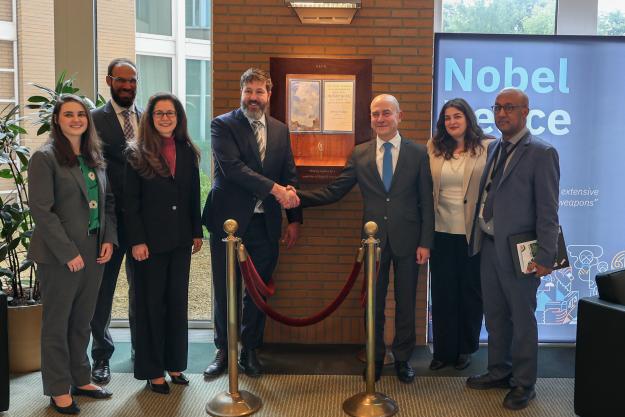The Director-General of the Organisation for the Prohibition of Chemical Weapons (OPCW), Ambassador Fernando Arias, met with the Principal Deputy Assistant Secretary of the Bureau of Arms Control, Deterrence, and Stability (ADS) at the U.S. Department of State, Mr Paul Dean on 30 May 2024 at the OPCW Headquarters in The Hague.
During their meeting, the Director-General and the Principal Deputy Assistant Secretary discussed various challenges related to the implementation of the Convention in the current international security environment. The Director-General lauded the OPCW Centre for Chemistry and Technology's role in bolstering the international effort to counter threats and prevent the re-emergence of chemical weapons. Additionally, he highlighted both the risks and opportunities presented by rapid scientific and technological advancements, including Artificial Intelligence.
The Principal Deputy Assistant Secretary expressed: "The United States continues to underscore an unwavering commitment in support of the Chemical Weapons Convention. Together, we will continue to prioritise transparency, accountability, and the safeguarding of global security against the threat of chemical weapons."
The Principal Deputy Assistant Secretary also informed the Director-General of the United States' intent to join forces with Lebanon in an innovative capacity development programme facilitated by the OPCW. The Mentorship Partnership Programme aims to bolster the capabilities of Lebanon's National Authority through the expertise and support of the US National Authority, with the OPCW Technical Secretariat playing a pivotal matchmaking role.
The programme goals include enhancing Lebanon's legal framework to comply with the Chemical Weapons Convention and developing a mid-term plan for chemical safety and security. It will also focus on creating a robust chemical incident response strategy and establishing comprehensive regulations for the chemical sector.
The Director-General congratulated the United States on the upcoming partnership, stating: "Collaborative efforts such as this share critical knowledge among National Authorities that contribute to our common mission. I express my sincere appreciation to the United States for its continued engagement in international cooperation projects that work to address the threat of chemical weapons and advance the implementation of the Chemical Weapons Convention across borders."

Background
The United States of America has been an active member of the OPCW since the Chemical Weapons Convention entered into force in 1997. The USA is a member of the Executive Council, the OPCW's executive organ, which is tasked with promoting the effective implementation of and compliance with the Chemical Weapons Convention as well as supervising the activities of the Organisation's Technical Secretariat.
As the implementing body for the Chemical Weapons Convention, the OPCW, with its 193 Member States, oversees the global endeavour to permanently eliminate chemical weapons. Since the Convention's entry into force in 1997, it is the most successful disarmament treaty eliminating an entire class of weapons of mass destruction.
In 2023, the OPCW verified that all chemical weapons stockpiles declared by the 193 States Parties to the Chemical Weapons Convention since 1997 - totalling 72,304 metric tonnes of chemical agents - have been irreversibly destroyed under the OPCW's strict verification regime.
For its extensive efforts in eliminating chemical weapons, the OPCW received the 2013 Nobel Peace Prize.






